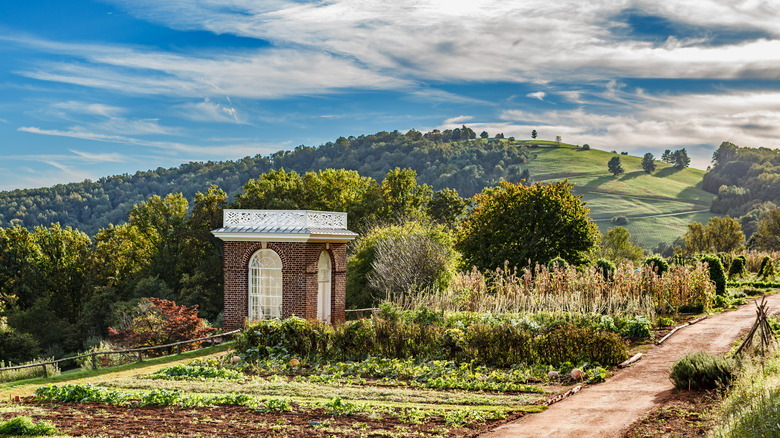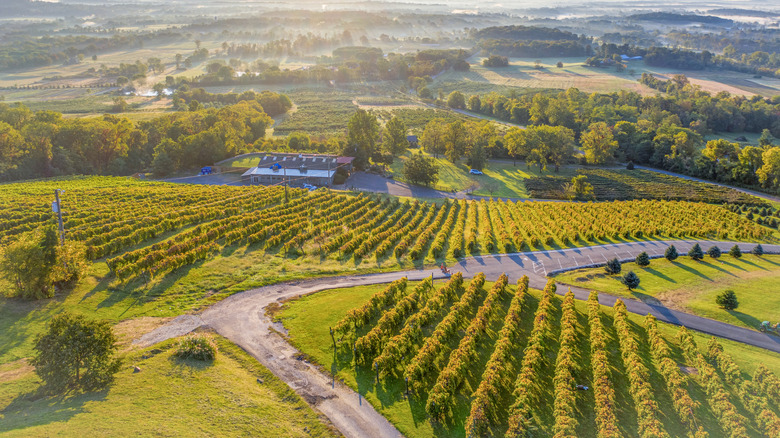What Makes Virginia's Wine Region Unique From Any Other
When you think about the wine-producing regions of the United States, your thoughts don't jump to Virginia as being the pinnacle of the industry. You probably think Napa or Sonoma in California, the Finger Lakes in New York, and maybe even the Willamette Valley in Oregon. But Virginia? Believe it or not, the Old Dominion actually has a thriving wine industry whose "region" is perhaps more unique than any other in the United States.
Why, exactly? What is it about Virginia's wine region that makes it so unique? Hint: It's in the name. Notice how California, New York, and Oregon all have specifically named areas for wine production. Those areas have special soil qualities and climates that allow specific wine varieties like Cabernet, Pinot Noir, and Riesling to thrive. Virginia doesn't have areas like that because the entire, 23 million acre state, from the Atlantic coast to the Blue Ridge Mountains, is a wine region in and of itself.
That's what makes Virginia so unique as a wine-growing region. It is utterly enormous and ecologically diverse. The experimentation that has resulted from this means that while there is no one grape or wine specific to Virginia, there is an amazing amount of variety — and that is developing some increasingly popular wines from one of the nation's oldest, most historically significant states.
A brief history of Virginia's vines
Virginia has been experimenting with growing wine grapes for over 400 years. Most of those centuries have been spent in trial and error, attempting to make the notoriously sensitive European grapes adhere to the climates, pests, and soils of the New World. Nearly all of the early attempts failed, but that didn't stop prominent colonial Virginians like George Washington and Thomas Jefferson from trying again and again.
Besides smuggling rice and growing rare apples, Jefferson was enthusiastic about developing vineyards in Virginia. So much so, in fact, that he grew up to 24 different grape varieties on an acre of land at his famous estate, Monticello. He additionally gave a whopping 2,000 acres to Italian winemaker Filippo Mazzei, encouraging him to establish a full-blown vineyard using Vitis vinifera vines from Europe. The attempts, sadly, failed.
A brief moment of colossal success came in the 1800s when Dr. Daniel Norton developed the Norton grape. A crossbreed between native Virginian vines and European grapes, the aptly named fruit flourished against the likes of common pests and harsh weather that had been so previously detrimental to the pure European varieties. The winemaking boom in Virginia caused by the Norton grape launched the state to international fame turning it into, then, the fifth-largest wine producer in the world. Unfortunately, Prohibition and the Great Depression put an end to the grape's success, with nearly all vines being decimated by the 1930s. But Virginia plugged on.
Modern popularity
Virginia's size and ecological diversity made it possible for a host of winemakers to begin experimenting with varietals and bring renewal to the industry during the 1970s. Places like Barboursville Vineyards and Jefferson Vineyards – whose grapes are grown on part of that original plot deeded to Fillipo Mazzei – began to have the kind of success early Virginian wine prospectors could only dream of. Between 1980 and 2022, Virginia's wine industry grew from just 6 to well over 300 vineyards now growing 11 varieties including Cabernet Franc, Chardonnay, Petit Verdot, Merlot, Cabernet Sauvignon, Viognier, Vidal Blanc, Petit Manseng, Chambourcin, Norton, and Sauvignon Blanc.
However, this variety comes at a price. Virginia has yet to produce a signature wine or come close to the 19th-century success of the Norton grape. Still, the sheer amount of variety being produced has led to some top-quality wines, making Virginia a place for many aspiring winemakers to call home. That, and the efforts of community resources like Virginia Wine and Commonwealth Crush Co., are fostering the development of small-farmed, high-quality wine across the Old Dominion. And while we wouldn't go so far as to call Virginia the new kid on the block, there is certainly an element of revival in this oldest grape-growing state.


